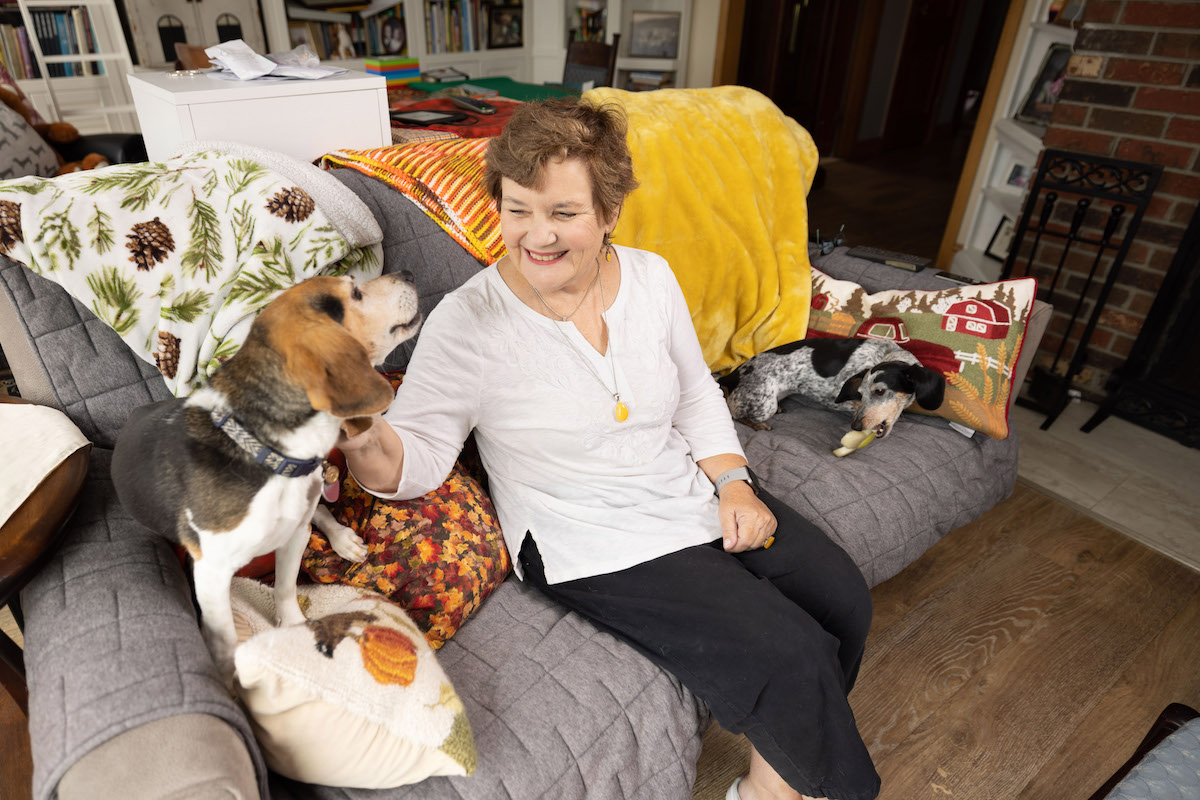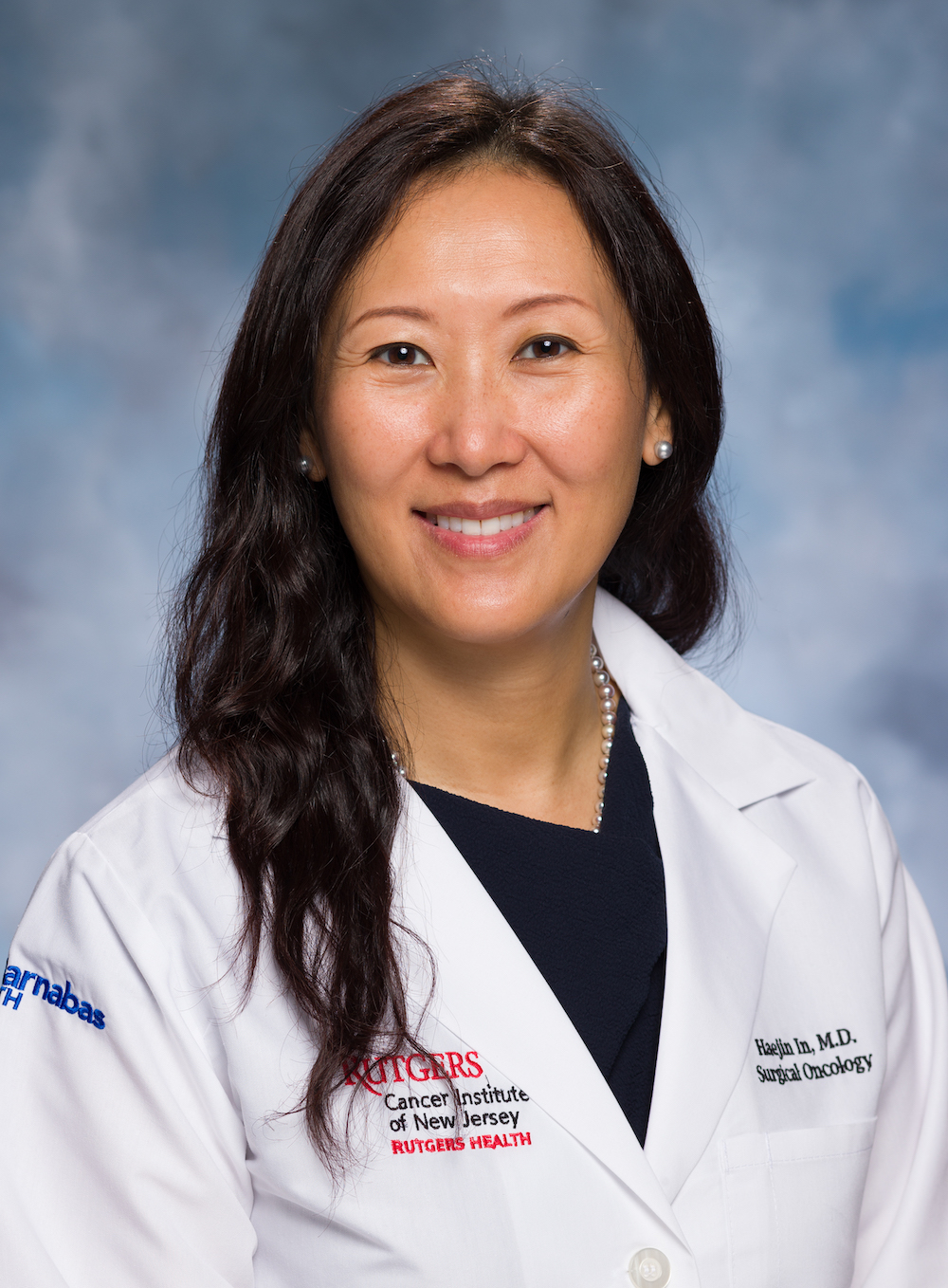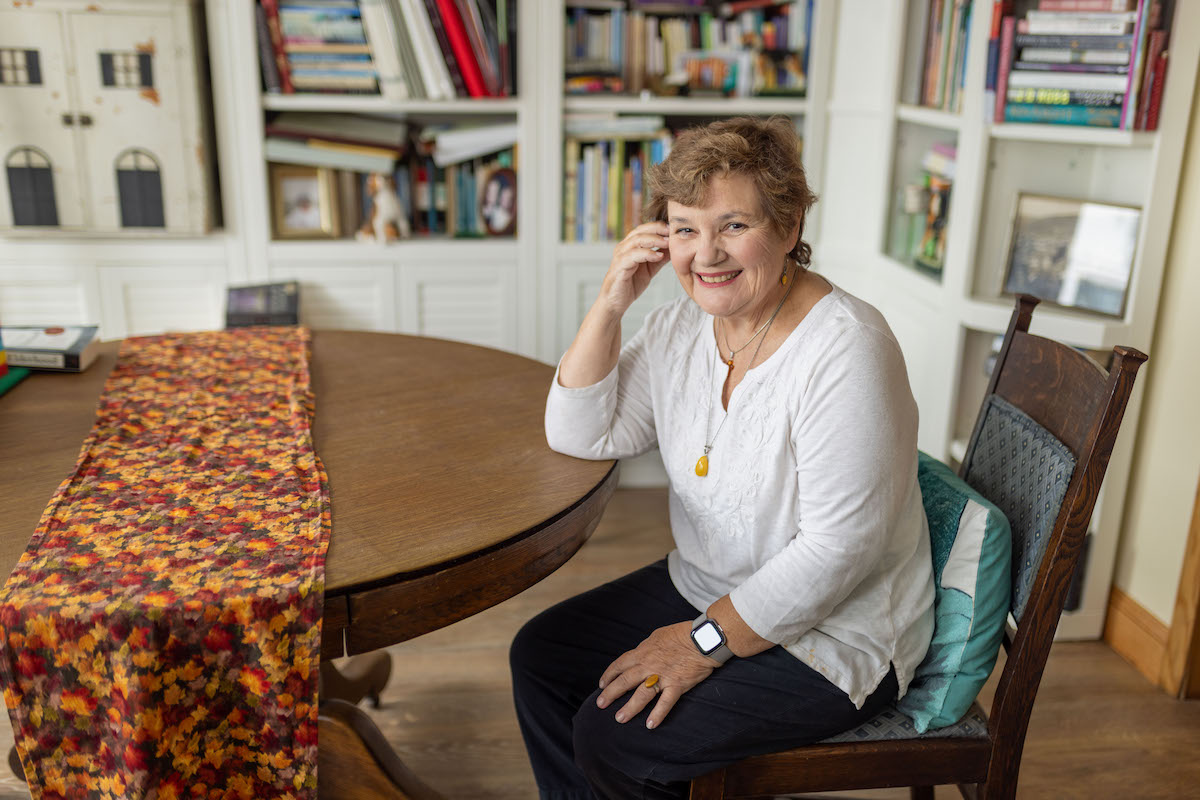
Story by Mary Ann Littell • Portraits by John O'Boyle Subscribe to Cancer Connection
Floods. Industrial contamination. Oil spills. Mining waste. Sewage leaks. In her long career at the Environmental Protection Agency (EPA) in Washington, D.C., scientist and clean water expert Margarete Heber has seen it all: the devastation caused by natural and man-made disasters.
Her work has taken her to some challenging places. As Hurricane Katrina tore through Louisiana, damaging the state’s water supply, Heber was part of a team tasked with monitoring water quality. When an embankment broke at a Colorado silver mine, releasing chemicals into the Colorado River, she monitored the safety of the water flowing downstream through tribal lands.
Perhaps prepping for environmental disasters was good preparation for her own ‘natural disaster.’ In spring 2022, she was diagnosed with adenocarcinoma, a type of stomach cancer that develops in the mucosal lining. Taking the lead in providing her care was surgical oncologist Haejin In, MD, MPH, MBA, at Rutgers Cancer Institute of New Jersey. She orchestrated a team of surgeons and other specialists who worked together, first, to determine how extensive the cancer was, and next, to provide lifesaving care.
“This is a very aggressive type of cancer, and her tumor ended up being even more aggressive than what our preliminary biopsies showed,” says Dr. In. “We planned her care with the input of our multidisciplinary tumor board. Two highly skilled teams performed state-of-the-art surgery and we were able to help her through a true team effort.”

Margarete Heber, pictured above, at home.
A native of Maplewood, N.J., Heber grew up camping, hiking, and enjoying other outdoor activities. “I’ve always loved the environmental sciences,” she says. “When I was too old to be a camper, I was a camp counselor.” After retiring from the EPA in 2017, she and her daughter Jonna, age 22, returned to New Jersey to care for Heber’s ailing father, who had a waterfront home in Toms River. He passed away in 2021. When COVID hit, the two decided to remain in Toms River. It seemed like an idyllic place to be during a pandemic.
Heber, who holds both an undergraduate and a master’s degree in zoology from Rutgers University, found many outlets for her abundant energy in Toms River. She’s been busy with home renovations and is also active in her church, ringing the bells at Sunday services. A trained Master Gardener, she transferred to the Ocean County program, which is managed by Rutgers Cooperative Extension. “All my Master Gardener activities were put on hold when I got sick,” she notes.
Busy and content as she was, in early 2022 something was on Heber’s mind: she was overdue for a colonoscopy. “My mother passed away in 2002 from gastric lymphoma,” she says. “So I’ve always been very vigilant about keeping up with all my tests and checkups.” In February she went for a colonoscopy and requested an endoscopy as well. A small biopsy of Heber’s stomach was taken as well. A week later Heber was called back into the office.
“The doctor said, 'There’s no easy way to tell you this: Your biopsy results indicate that you have adenocarcinoma,’” says Heber. “She didn’t know the stage, or how widespread it was yet.”
Gastric adenocarcinoma is relatively rare, accounting for about 1.5% of all new cancers diagnosed in the U.S. each year, according to the American Cancer Society. The outlook for such cancer depends on the stage in which it is diagnosed. People diagnosed in the early stages have a much better prognosis than those at a later stage. The five-year survival rate for stomach cancer may be as high as 70% (for little spread) or as low as 6% (for advanced spread).
“This news was really devastating, not only for me, but also for my daughter,” says Heber.
Planning for the next steps, my gastroenterologist called a friend, who recommended Dr. In at Rutgers Cancer Institute. “My doctor said she could recommend a few cancer specialists in New York City, or I could see Dr. In,” says Heber. “I did my research. Dr. In’s background looked fantastic - her credentials and training are top-notch. I liked the idea of getting my care close to home, so I opted for her.”

After being diagnosed with adenocarcinoma, Margarete Heber learned about surgical oncologist Haejin In, MD, MPH, MBA, (pictured above) who took the lead in providing her care at Rutgers Cancer Institute. “I did my research, Dr. In’s background looked fantastic - her credentials and training are top-notch,” says Heber. Adding, “I liked the idea of getting my care close to home.”
Credit: Steve Hockstein
Meeting the oncologist in March 2022, Heber knew she’d made the right choice. “She’s so smart and has wonderful people skills,” says Heber. “She explains everything thoroughly, even draws pictures. She was great at reassuring Jonna too. She told us, ‘The three of us are going to be great friends for the next few years.’”
“With her family history of cancer, Margarete was right to be vigilant with her colonoscopy,” says In, who is also chief diversity officer and associate director of diversity, equity and inclusion at Rutgers Cancer Institute and associate professor of surgery and of heath, behavior and policy at Rutgers Robert Wood Johnson Medical School. In addition to her clinical practice, she maintains a robust research program to develop strategies to screen for stomach cancer in the U.S. “Because Margarete also requested an endoscopy, her cancer was caught early,” Dr. In. “Gastric (stomach) adenocarcinoma is rare in the U.S., so population-based screening isn’t the right approach. But we do need to figure out how to identify those at high risk and be sure they get screened. In that way, we can treat people with early-stage disease rather than advanced cancer, and maybe even be able to say we can cure them.”
The physician’s first step was sending Heber to Amy Tyberg, MD, a gastroenterologist and associate director for endoscopy at Robert Wood Johnson University Hospital, an RWJBarnabas Health facility, for an endoscopic ultrasound. “This minimally invasive test helps us assess the depth of tumor invasion,” she says. Noting that the cancer was small, Dr. Tyberg took biopsies of the stomach and a few lymph nodes.
When the results confirmed that the cancer was in the early stages, Dr. In decided to perform a minimally invasive procedure: endoscopic submucosal dissection (ESD). “This is a relatively new treatment option for very early gastric cancer, enabling us to take out the tumor without removing all of the stomach,” she says. “In the ‘old days,’ before we had this procedure, the entire stomach would be removed.”
ESD requires a high degree of expertise, precision, and technical skill, so it remains in the domain of academic centers like Rutgers Cancer Institute and Robert Wood Johnson University Hospital that specialize in cutting-edge cancer therapies. Performing Heber’s ESD was Michel Kahaleh, MD, Clinical Director of Gastroenterology at Rutgers Robert Wood Johnson Medical School, and the RWJUH advanced gastroenterology team. Going through the mouth with the endoscope, Dr. Kaheleh lifted the mucosa and removed a small portion of the inner stomach lining in the area of the tumor.
The pathology results indicated that the cancer had clear margins on the sides, but extended deep into the stomach tissue, so Heber would need a proper surgical gastrectomy. Dr. In performed this procedure laparoscopically. Through a few incisions in the abdominal wall, approximately 75 percent of Heber’s stomach was removed, along with the surrounding lymph nodes. A reconstruction was performed, called an anastomosis: a loop of small intestine was attached to the stomach so food could pass through the stomach to the small intestine.
Five days after the surgery, Heber returned home to recuperate. She admits it wasn’t easy. “For the first few days in the hospital, I felt good,” she says. “But once I was home, I was very sick for several days. I couldn’t keep food down.”
This response is typical after extensive stomach surgery, explains In. “The stomach that remains goes into a bit of a shock. Simply put, it doesn’t want to work. We started her on a medication, Reglan, a motility agent, to give her stomach a jump-start.” Dr. In also referred Heber to a nutritionist to help her plan her meals. “Over the long-term, people who undergo this surgery start to adjust, and they learn how to eat well,” she continues. “The remaining stomach will start to accommodate. I have many patients who eat pretty normally. Of course, with a smaller stomach, you won’t be able to eat big meals.”
On top of everything Heber was dealing with, shortly after the surgery she tested positive for COVID, as did her daughter. “We were both miserable,” she notes. After weeks in bed, Heber says, “I was as weak as a puppy. I had no leg or arm strength. I asked Dr. In if I could do some physical therapy. That has helped tremendously.”

As Margarete Heber’s team of surgeons and other specialists at Rutgers Cancer Institute of New Jersey worked together to provide her with cutting-edge cancer therapies and lifesaving care, she knew she made the right choice. “I’m so thankful for the great care I received,” she says.
The good news is that following the second surgery, Heber’s pathology reports were negative. “All the tissue we removed showed no cancer at all, so no chemotherapy is necessary,” says Dr. In. “We’ll follow her closely. Her prognosis is quite good. Five-year survival for this type of cancer is somewhere around 70 percent.”
Heber’s case was reviewed by the multidisciplinary tumor board at several points throughout her treatment. “This brings together all the different disciplines -surgical oncology, medical oncology, radiation oncology, and the GI team,” explains In. “When we’re deciding on treatment, we’ll have a discussion to make sure everyone is in agreement. The tumor board is also a good way to share information. We all want to have the latest, greatest knowledge. But we recognize it’s hard to know everything yourself.”
“I’m still figuring out what I can eat. But, I went to the Italian festival here in town and I had eggplant rollatini, with sauce and cheese, and it was fine!” says Heber. “I’m so thankful for the great care I received.”

